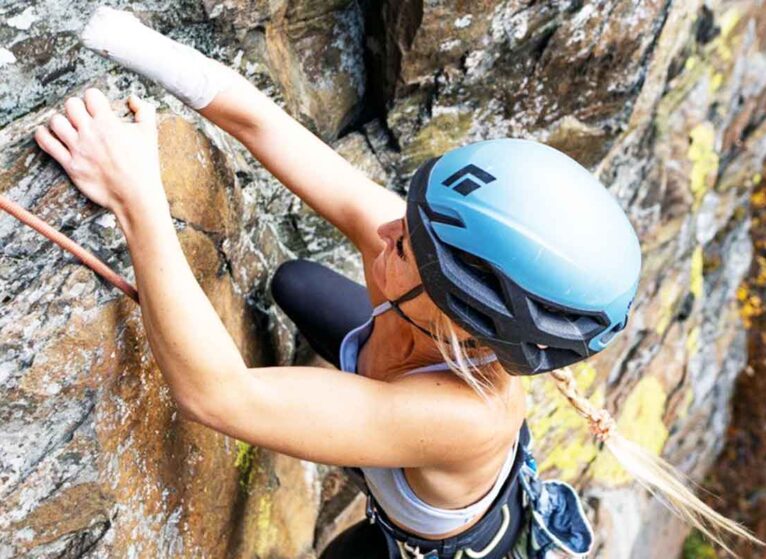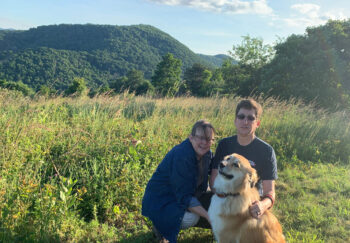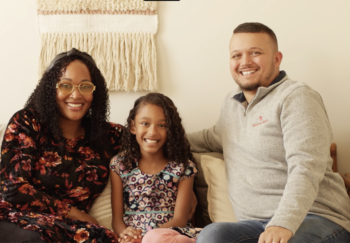In 2017, Charlottesville local Allie Redshaw had a freak accident that resulted in the amputation of her right hand. Bobby Chhabra, MD, director of the UVA Health Orthopedic Center, performed the emergency surgery.
When I sat down with Allie, I was braced for a story of loss. Instead, I found myself deeply moved by the human capacity to discover wonder and create connection out of devastating circumstances.
Allie tells her story.
The Incident
I'm a formally trained chef. I went to The Culinary Institute of America up in Hyde Park, New York. It’s a formal education for all things hospitality and culinary, including the use of big industrial machinery.
On March 1st, 2017, I was working in the early morning at Lampo. I was there with 2 co-workers. We always got there at the same time, and we pretty much did the same tasks every day.
My husband Ian and I had just found out that we were pregnant with Willow. I had just taken a pregnancy test like maybe 5 or 6 days prior to that. We were very early in the pregnancy. Our other daughter was about 18 months old.
That day, my glove got pulled down into the auger of the meat grinder.
Survival Instincts
There's been so much echoing of people saying, “Wow, you're so inspiring; you've overcome so much!’ There hasn't been like a whole lot of time to just kind of sit with what happened. It wasn't awesome. It hurt really bad. I’ve never sat with how badly it hurt.
I don’t know how I was able to be verbal.
My phone was locked. It had a keypad that either needed my face or a code, so I had to tell my co-workers the code to my cell phone so they could call Ian and tell him I was hurt. And I was able to let the paramedics that I was pregnant.
I think it's just one of those crazy Mother Nature instinctual things. All of your instincts, all of the care and nurturing that you put into your body for this kind of moment, all of it kicking in.
It happens so quickly. You don't really sit and think about how you were able to survive. It was insane and amazing.
The paramedics could have tried to remove the grinder on scene. The risks were blood loss, or hitting something in my body that was really important, or just not being able to get to the hospital in time. Instead, they contacted the hospital and got in touch with somebody in pediatrics in the ER to talk about what they could give me and what they couldn't give me so that the baby was safe.
I remember being on the stretcher with the grinder in my lap. They put a sheet over the grinder because at first, the grinder was still on my arm, and there were pieces of my finger and my arm on the floor. And obviously blood was everywhere.
There were a lot of trucks and a lot of sirens. I remember going out of the front door and that's the last thing I really remember until I was in triage.
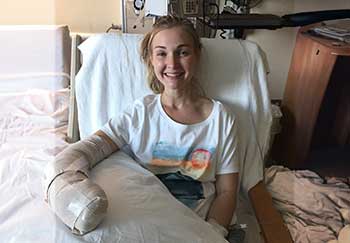
Waking Up to a New Reality
I remember waking up in recovery and my husband being there. First and foremost, he let me know that Willow was okay. That was the first thing he said to me and the first thing that I asked about. And then he let me know that that my hand had been amputated.
I remember saying, “Why?” I had so many questions.
For both Dr. Chhabra and Ian, there were a lot of hard choices that had to be made when I wasn't able to make them for myself.
The decision to fully amputate was a difficult one. I was right-handed. There were remaining parts to my hand that had a little bit of pinky, some flesh. They were having to think about my future and the use of a prosthetic. If I wanted to get back in a kitchen again, what would be my most efficient option?
Dr. Chhabra, during surgery, tucked my nerves back into my arm, so that there was no severing of nerves that didn’t need to be. That prevented a lot of phantom limb pain. Because of the way he dealt with the remaining nerves and the nerve block catheter that they put into my shoulder, for the most part I live free of any aching or nerve discomfort. This is absolutely huge. For most of the amputees I’ve met, that is a huge part of their journey — navigating those pains that come unexpectedly.
So I count myself to be very, very, very lucky that Dr. Chabra was as diligent as he was, and his care team was as diligent as they were.
To Dr. Chhabra, I owe everything in the world. I think he is the most incredible surgeon and person. He made all the choices that he made to keep Willow and me as safe and as functional as we could be.
Recovery & Discovery: Post-Amputation Therapy
After I was released from the hospital, home health came out to the house and were constantly making sure that bandages were changed, checking in on the nerve block, and taking my weight to make sure that Willow was okay. So much nurturing.
I did physical therapy (PT) through UVA Health. They were wonderful, absolutely wonderful. I had really, really great therapy experiences, PT and occupational therapy. I did a lot of desensitizing exercises. They're very physically challenging, but also emotionally very triggering, just attuning the nerves and skin to sensations they’ve never felt before.
You don't think about it, how things are going to feel at the tip of your forearm, or your wrist, but the skin there is really different. Your hands have callouses, built up over years.
They would have a little thing of warm wax, and I would very gently get my skin used to going into the warm sensation. Then it was putting my arm in a bucket of dry rice, getting used to the prickly feeling.
I also did a lot of mirror therapy, which stimulates the different parts of your brain where you're perceiving your abilities and sensations and what's there and what's not.
Welcoming Willow
For a lot of my pregnancy, I was very depressed. I felt like my career had really been stripped away. I am a very active being, physically, and everything was put on halt. That was a huge piece part of my mental health: My mind was still going, and I had all this stuff to worry about all the time, and I couldn’t get it out.
I wasn't sure how I would ever surmount that. I couldn't really see the path forward.
And then Willow was born and of course, that was a huge joy and a celebration. And it felt like such a huge hurdle that we’d been through — to know that Willow is safe, and it was just my body that I was worrying about now. I could start moving again. I could start being outside. I could start pushing myself more.
I started to see a little bit more light in the sky every day.
Life After Birth
I was recommended to check out this amputee rock climbing clinic out in Colorado. And that was everything for me: meeting other amputees, seeing other people who had navigated this from birth, amputees who had served in the military and had horrific accidents. Some of them had lived for years and years with post-traumatic stress disorder.
It was just this new world to me. I was able to ask questions like, “I know this is really stupid, but how do you hold your fork?” or “how do you button your pants?” or “how do you tie your shoes?” I felt like a kid, learning everything new again.
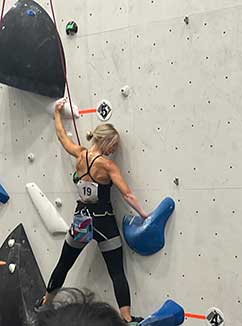
And it was incredible. Watching friends with no legs strapping up in a harness and using just their arms to get to the top — it was just a truly mind-blowing experience. I learned so much. I gained so much perspective. I felt so honored and happy and grateful to be there.
The woman who hosted that clinic, Kirsty Ennis, is now one of my very best friends and mentors. She lost her left leg in a helicopter crash. She started her nonprofit, the Kristie Ennis Foundation, and is a force to be reckoned with.
Or there’s Molly, whose daughter was born with a limb difference. She needed community, so she started an organization that hosts a weekend festival every year, Lucky Fin. It’s become a huge sensation. There's famous athletes, musicians, actresses, people with different bionic arms, all of the princesses with different bionic pieces. It's a whole other world and it's so cool. I feel like I'm kind of taking a deep dive into this huge wave.
So many in the disabled community are doing this now — creating space for those who are new to the community. You feel so isolated and alone, and then you're just enveloped with this knowledge and wisdom and welcome, like, “Hey, we know it's all new, but guess what, we're going to navigate through it together. And if you have questions, you can call, and if you need a piece for your prosthetic, here's who to reach out to.” There's just this huge network of iclusion and acts of selflessness. I would not be anywhere without the community.
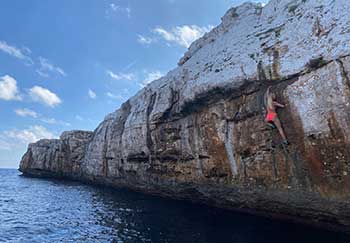
Climbing With Gratitude
I got my yoga teacher certification. It's just been a gift for my mind and my body and mental health, again, challenging myself with new ways of movement, ways that I can adapt and make it my own. I’m actually in the process of starting a nonprofit with 2 other congenital amputees who live in different corners of the world. It's called Adapting Together, and last year, we hosted our first adaptive yoga retreat for women with limb difference, and we did it here in Virginia. This year, we're hosting a New Year's adaptive yoga retreat for women with limb difference in California.
Strong Moms
Love an inspiring story?
I mountaineer, I do yoga, and I’m on the competitive climbing circuit. Twice I’ve been out deep-water soloing, which is a form of rock climbing where you're outside, over water, unroped.
You just climb as high as you can go and then you fall into the water.
And every time I see Dr. Chhabra, I end up in tears. I just I can't believe how something so tragic could pave the way for something so beautiful with so many adventures, so many moments of learning and teaching.
